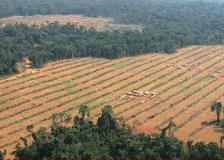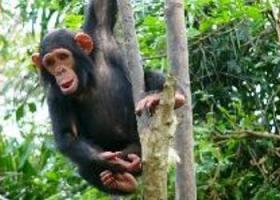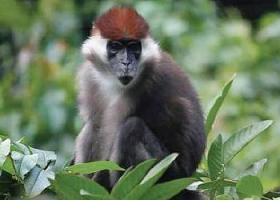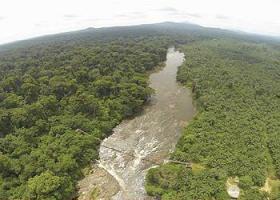from Environmental News Service

Herakles Farms plantation in Cameroon, 2013 (Photo courtesy SAVE Wildlife Conservation Fund)
AMSTERDAM, The Netherlands, August 9, 2013 (ENS) – Endangered chimpanzees, other primates and forest elephants could lose stretches of their habitat in Cameroon if a U.S. company’s plan to establish a palm oil plantation goes ahead.
Based in New York City, Herakles Farms, known as SG Sustainable Oils in Cameroon, has claimed that its palm oil project in Cameroon’s Southwest Region would convert an area of little conservation value.
But a new study by Dschang University in Cameroon, conducted in collaboration with Germany’s University of Göttingen and supported by Greenpeace International, SAVE Wildlife Conservation Fund of Germany and WWF Germany, indicates that this claim misrepresents the project area.
The Herakles Farms plantation concession is bordered by four protected areas, including Korup National Park, and acts as an important corridor for wild animals.
The forested area is located on Cameroon’s western border with Nigeria, within the Guinean forests of West Africa, an area known as a biodiversity hotspot.
The study found the concession area to be inhabited not only chimpanzees, but also forest elephants, rare primates such as the Endangered drill and the Critically Endangered Preuss’s red colobus monkey, plus a number of fish species, many native to the region and found nowhere else on Earth.
Dr. Matthias Waltert in the Department of Conservation Biology at Georg-August-Universität Göttingen writes in a preliminary report of his team’s research in the area, “These results show clearly that the planned concession area is of high conservation value. They also show that previous surveys were insufficient to establish adequate information on large mammal presence.”
In total, 23 large mammal species were recorded in one block of the concession. The block contains all primate and duiker species which are also listed for the adjacent Korup National Park, with one exception.
The mammals or signs of them found in this block include: Elliot’s chimpanzee, Pan troglodytes ellioti, the drill, Mandrillus leucophaeus, Preuss’ Red Colobus, Procolobus preussi, and red-capped Mangabey, Cercopithecus torquatus.

Elephant trails and dung were recorded from four transects. All four species of duiker known from the region were recorded as well. The forest buffalo was not recorded, Dr. Waltert reports.
“The U.S. government has invested heavily in recent years in the conservation of the Elliot’s chimpanzee,” said Filip Verbelen, forests campaigner with Greenpeace International. “It is therefore both ironic and tragic that an American company is set to destroy a forest area that is vital for the survival of these chimpanzees.”
The Nigeria-Cameroon chimpanzee is listed by the International Union for the Conservation of Nature as Endangered. Scientists estimate as few as 3,500 survive in the wild.
Elliot’s chimpanzee has suffered high rates of decline due to habitat loss and is recognized as the most threatened and least distributed of all the chimpanzee subspecies. Recent field research by Greenpeace in the plantation concession area also found evidence of chimpanzee nests.
The drill is one of Africa’s most endangered primates and 80 percent of the world’s remaining drill habitat is in a relatively small forested part of Cameroon.
“The results of our survey show that the proposed concession area is of high conservation value, while some parts could even act as a chimp sanctuary,” said Dr. Kadiri Serge Bobo of Dschang University, Cameroon. “They also show that prior studies presented by the company were inadequate and failed to confirm the presence of threatened mammal species.”
Fishes occurring in the plantation concession area are of high conservation value, reports Dr. Waltert.
“This area contains relict fish assemblages and was therefore of major importance for African fish evolution, with Etia nguti being a phylogenetic sister taxon to the majority of African cichlids,” he wrote. “Conservation of these waters is therefore of very high conservation priority.”
“In addition, the survey revealed the presence of a fish species probably new to science, the cyprinid Brycinus sp. aff. intermedius, so far only known from the concession area,” wrote Dr. Walter.

Herakles Farms suspended work on the Cameroon plantation project in mid-May in response to an order it received from the government of Cameroon’s Ministry of Forestry and Wildlife, MINFOF.
The order requests that the company cease preparing land near its Talangaye nursery, the resumption of activities “being subject to a declaration of public usefulness made to the zone where your entire project is located.”
The order comes at a time when the company’s main activity is the transfer of young trees from the nurseries to their permanent places in the field near the village of Talangaye.
Herakles Farms says on its website, “The Company had obtained permission to proceed and always has and will comply fully and transparently with government regulations in force. The Company hopes to understand and resolve these actions by the MINFOF.”
The company has had to lay off or furlough most of its 690 employees in Cameroon as a result of the MINFOF order.

The environmental groups allege that the plantation “has been operating illegally and linked to corrupt practices.”
“The project has also been developed without the adequate consultation or free prior and informed consent of residents, many of whom oppose the project and risk the loss of their customary land and livelihoods,” the environmental groups warn.
But on March 9, Dr. Chief Atem-Ebako, chief of Talangaye Village, told an audience at Kumba City Council Hall, “SGSOC always consults the communities. These are your real partners and stakeholders. We thank you for recognizing the importance of the community. In many respects, SGSOC is our own minister. It is the partner that is going to bring us the development that we need.”
Chief Atem-Ebako was speaking during the maiden annual general assembly of the association formed to ensure the smooth implementation of the memorandum of understanding signed between the company and the villages where the project is taking place.
Nevertheless, some Cameroonian and international groups are calling for cancellation of the project.

